
Harvest and Heritage: Exploring the Annual Tea Festival in Ban Rak Thai
Experience Ban Rak Thai’s Annual Tea Harvest Festival where mountains meet tradition in northern Thailand. Discover tea fields, cultural workshops, and gentle hikes that reveal the harmony between nature and local heritage.
Wear sturdy, waterproof shoes
Trails around Ban Rak Thai can be slippery from dew or sudden rainfall, so solid footwear with grip will keep you stable on earthy and stone paths.
Bring sufficient water
Water sources along plantation trails are scarce. Carry at least 1-2 liters, especially if hiking during warmer parts of the day.
Start early to avoid heat
Mornings offer cooler temperatures and softer light for better photography, plus more comfortable hiking conditions.
Use local guides for cultural insight
Hiring a local guide enriches your understanding of tea cultivation and festival traditions, deepening your experience beyond the surface.
Harvest and Heritage: Exploring the Annual Tea Festival in Ban Rak Thai
Ban Rak Thai, perched on the rugged edge of Mae Hong Son Province, invites adventurers into the annual Tea Harvest Festival, a vibrant celebration blending nature's pulse with local craftsmanship. This mountain village, roughly 50 kilometers north of Mae Hong Son city, thrives on its fertile black soils and cool mountain air—perfect conditions for its signature oolong tea.
Each year, in late November through early December, Ban Rak Thai comes alive. The festival is less about staged events and more about the honest rhythm of tea picking and processing, inviting visitors to witness the hands that coax flavor from leaf to cup. Walking through tea plantations, the rows hum quietly with the day’s work as each leaf is plucked, dried, and brewed within earshot of gently rolling hills and the forest’s edge standing watch.
Navigating the village and its surrounds calls for light hiking. Trails linking scattered plantations span from gentle paths of 2 to 5 kilometers, with elevation gains around 150 meters. The terrain is a mix of soft earth trails, stepped terraces, and occasional stone paths. These provide a manageable challenge for casual hikers yet still engage seasoned trekkers eager for visual and sensory details—the wet leaves’ fresh aroma, the cool breeze hinting at winter’s approach, and distant views of the Shan Hills bordering Myanmar.
Beyond the festival, the forest nearby is fiercely itself—birch and pine trees stand alert, their canopies whispering encouragement as you move forward. Water streams dare you closer, their currents pushing onward, shaping the land and the communities thrived upon it. It’s this natural pulse that powers the festival’s soul.
Preparation is straightforward but essential. Footwear with good grip is necessary for slippery sections after early morning dew or occasional rain. Hydration is key: water sources are limited along trails, so carry more than you expect to need. Aim to arrive before peak mid-day sun when the temperature balances comfortably between crisp chill and warming light.
The festival isn’t just about watching; it’s an invitation to join local workshops where tea tasting, twig weaving, and Chinese Yunnan cultural performances offer hands-on insight. Accommodations tend towards simple guesthouses in the village or nearby Mae Hong Son city, where you can replenish before or after your visit.
For anyone looking to combine cultural immersion with outdoor exploration, the Annual Tea Harvest Festival offers a rewarding blend of sensory and practical adventure, grounded in community life and nature's relentless cycle.
Nearby Trips
All Adventures
Boat Charters
Water Activities
Adventures near Ban Rak Thai, Mae Hong Son Province
Discover the unique and memorable adventures that make Ban Rak Thai, Mae Hong Son Province special.
Frequently Asked Questions
What makes the tea from Ban Rak Thai unique?
Ban Rak Thai's tea benefits from its high-altitude climate and black soil, producing oolong tea with a distinctive floral aroma and smooth, rich flavor not commonly found elsewhere.
How crowded does the Tea Harvest Festival get?
The festival draws a steady but manageable flow of visitors—far from overwhelming crowds—making it possible to enjoy both cultural activities and quiet moments among the plantations.
Are there guided tours available during the festival?
Yes, local guides offer tours emphasizing tea farming techniques, cultural history, and nearby natural trails, providing a richer and safer experience, especially for first-time visitors.
What wildlife might I encounter around Ban Rak Thai?
Forest areas near the village frequently host species such as barking deer, squirrels, and a diverse range of birds, including hornbills and the occasional woodpecker, particularly in the cooler months.
Can I participate in the tea harvesting process?
Visitors often have the opportunity to try their hand at plucking tea leaves and learn traditional processing during hands-on workshops, which enhance appreciation for local craftsmanship.
Are accommodations available within Ban Rak Thai during the festival?
Simple guesthouses and homestays operate in Ban Rak Thai, but spaces fill quickly in festival season. Many visitors opt to stay in Mae Hong Son city, a convenient 1.5-hour drive away.
Recommended Gear
Hiking boots
Provides traction and ankle support on wet or uneven terrain common in tea plantation trails.
Water bottle with filter
Ensures access to safe drinking water since natural sources are limited and carry risk.
Light windbreaker
Protects against cool mountain breezes and occasional drizzle during the harvest season.
Wide-brimmed hat
Offers sun protection during hikes when temperatures rise and sunlight strengthens.
Local Insights
Hidden Gems
- "The secluded viewpoint near Santichon Village overlooks adjacent tea terraces and the Myanmar border mountains—offering broad, often empty vistas at dawn."
- "A small waterfall lies a 30-minute hike from the village, where crystal-clear water cascades into natural pools favored by locals for cooling off."
Wildlife
- "Red junglefowl"
- "Asian barred owlet"
- "barking deer"
- "various mountain butterflies"
History
"Ban Rak Thai was founded by Kuomintang soldiers fleeing China in the 1940s, bringing tea culture and customs that blended with local Shan traditions, giving the village a unique cultural identity."
